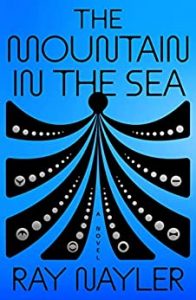Gary K. Wolfe Reviews The Mountain in the Sea by Ray Nayler
 The Mountain in the Sea, Ray Nayler (MCD 978-0-37460-595-7, $28.00, 464pp, hc) October 2022.
The Mountain in the Sea, Ray Nayler (MCD 978-0-37460-595-7, $28.00, 464pp, hc) October 2022.
Here’s another genre term that seems to have shifted meaning over time. For a field that sometimes proudly calls itself “speculative fiction” – an upscale term designed to get you invited to more parties than “science fiction” would – most SF features remarkably few scenarios in which characters actively speculate about much of anything. (I guess the argument is that the speculation is involved in the construction of the story-world, not in the thoughts of particular characters, but still.) In Ray Nayler’s remarkable first novel The Mountain in the Sea, though, the main characters are speculating all the time – about consciousness, perception, communication, language, neural structures, corporate greed, social organization, environmental depredation, artificial intelligence, and most of all, octopuses. Far from bogging down the narrative into a series of infodumps and as-you-know-Bobs, those speculations form the core of the novel, and Nayler presents them with such immediacy and passion that the intellectual adventure is as compelling – more compelling, really – than his tale of corporate intrigue, high-seas adventure, and characters dealing with past traumas while searching for some sort of identity. It’s also a first-contact tale – though the alien intelligences come not from space but from our own oceans – while at the same time being a shrewd critique of first-contact tales, somewhat in the manner that Kim Stanley Robinson’s Aurora was a critique of generation starship sagas. “This isn’t a first-contact story,” says Nayler’s main character, “where humanity achieves enlightenment because we finally realize we aren’t alone in the universe, and we all hold hands and sing around a campfire together staring up at the stars. We don’t have the capacity as a species for a happy ending like that.”
If that sounds like a rather dark view of human ity, it’s one that is shared by most of Nayler’s main characters. The central figure, Dr. Ha Nguyen (whose How Oceans Think provides so many lengthy and provocative chapter epigraphs that we nearly feel we’ve read her whole fictional book), arrives at a research station on the Vietnamese archipelago Côn Đảo to continue her research on octopus intelligence. This is no ordinary research facility, though: the entire archipelago has been purchased by the giant conglomerate DIANIMA for reasons that aren’t immediately clear. Ha is greeted by Altantsetseg, an fantastically tall woman who speaks through a faulty translating device (an early sign of the translation problems that will become a central theme) and who later proves a master at using her whole body to control an army of drones. The research team leader at the facility – and the one who had her summoned – turns out to be the world-famous Evrim, an android who is “the only (allegedly) conscious being humankind had ever created,” and whose designer, Dr. Arnkatla Minervudóttir-Chan, is also the shadowy mastermind behind the DIANIMA corporation. Together, Ha and Evrim begin to uncover unsettling evidence not only of octopus intelligence, but of language, tool use, and even weapon-making. Their discussions about the daunting problems of communicating with a species whose perception of the world and even body shape are so radically different from ours constitute the most fascinating discussion of the knotty problems of alien communication I’ve seen since Ted Chiang’s “Story of Your Life” – but the aliens here are real creatures we’ve already met (or at least think we have).
Two other plot lines provide counterpoint to Ha’s research, but also reflect in different ways the issue of artificial intelligence that has made Evrim such a controversial figure (following his creation, several nations outlawed such research). The most harrowing is the tale of Eiko, a programmer who, on the eve of his job interview with DIANIMA, is kidnapped and enslaved aboard a fishing vessel called The Sea Wolf, staffed by brutal guards but controlled by an AI for whom the lives of the enslaved people are but data points in a profit algorithm. A more conventional espionage plot involves Rustem, a skilled cyberspy known for his ability to hack AIs and neural networks, and whose skills have drawn the attention of a mysterious woman who hires him for his greatest challenge. It takes a while for the three plotlines to converge, but these two additional narratives give Nayler a chance to reveal a world beyond the rather hermetic confines of Côn Đảo, where Ha and Evrim eventually learn that no communication with the outside world is allowed, and that both are in fact prisoners. While at times The Mountain in the Sea gives the impression of a novel about the ethics of artificial intelligence grafted onto a different novel about learning to communicate with octopuses, in the end the themes complement each other in resonant ways. The result is a genuinely intellectual thriller that does what SF does best – that is, to keep the ideas as exciting as the action – and is a superlative example of what the late David Hartwell once termed “neurological hard SF.”
Gary K. Wolfe is Emeritus Professor of Humanities at Roosevelt University and a reviewer for Locus magazine since 1991. His reviews have been collected in Soundings (BSFA Award 2006; Hugo nominee), Bearings (Hugo nominee 2011), and Sightings (2011), and his Evaporating Genres: Essays on Fantastic Literature (Wesleyan) received the Locus Award in 2012. Earlier books include The Known and the Unknown: The Iconography of Science Fiction (Eaton Award, 1981), Harlan Ellison: The Edge of Forever (with Ellen Weil, 2002), and David Lindsay (1982). For the Library of America, he edited American Science Fiction: Nine Classic Novels of the 1950s in 2012, with a similar set for the 1960s forthcoming. He has received the Pilgrim Award from the Science Fiction Research Association, the Distinguished Scholarship Award from the International Association for the Fantastic in the Arts, and a Special World Fantasy Award for criticism. His 24-lecture series How Great Science Fiction Works appeared from The Great Courses in 2016. He has received six Hugo nominations, two for his reviews collections and four for The Coode Street Podcast, which he has co-hosted with Jonathan Strahan for more than 300 episodes. He lives in Chicago.
This review and more like it in the October 2022 issue of Locus.
 While you are here, please take a moment to support Locus with a one-time or recurring donation. We rely on reader donations to keep the magazine and site going, and would like to keep the site paywall free, but WE NEED YOUR FINANCIAL SUPPORT to continue quality coverage of the science fiction and fantasy field.
While you are here, please take a moment to support Locus with a one-time or recurring donation. We rely on reader donations to keep the magazine and site going, and would like to keep the site paywall free, but WE NEED YOUR FINANCIAL SUPPORT to continue quality coverage of the science fiction and fantasy field.
©Locus Magazine. Copyrighted material may not be republished without permission of LSFF.







You had me at “…the intellectual adventure is as compelling….” Spec fic is, of course, at heart a game of speculation about the character of reality, or other realities, either in dialogue or by portrayal. I’ll be ordering a copy of this one, and thanks for the review!